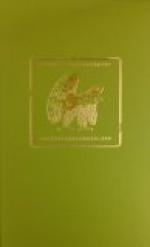There was a long silence, broken once more by that far, wailing cry on the wind. Miss Armitage started. She laid her hand on Tisdale’s shoulder, the nearest object, in a tightening grip, while for a breathless moment she leaned forward, trying to penetrate the darkness of the gorge. The action seemed to remind him of her presence, and he turned to look at her. “Frightened again?” he asked.
Her hand fell; she settled back in her seat. “N-o, not very much, but it took me off guard. It sounds so desolate, so—so—supernatural; like the cry of a doomed soul.”
Tisdale smiled. “That describes it, but you never have heard it at close range.”
She shivered; her glance moved again in apprehension to the night-enshrouded Pass. “Have you, Mr. Tisdale?”
“Yes, lonesome nights by a mountain camp-fire, with just the wind piping down a ravine, or a cataract breaking over a spur to fill the interlude.”
“Oh, that must have been terrifying,” and the shiver crept into her voice. “But what did you do?”
“Why, I hurried to pull the embers together and throw on more spruce boughs. A cougar is cautious around a fire.”
There was another silence, then, “I was thinking of your little, white-faced woman,” said Miss Armitage. “She baffles me. Was she your bravest woman or just your anemone? Would you mind telling me?”
“So you were thinking of her. That’s odd; so was I.” Tisdale changed his position, turning to lean on the edge of the porch with his elbow resting on the floor. “But it was that Gordon setter there that reminded me of her. Her dog had the same points, though he had been better trained.” He paused briefly, then said: “She was both. She was like that small, white flower which grows in the shelter of the Alaska woods—sweet and modest and frail looking—yet she was the bravest woman and the strongest when it came to endurance I ever knew.”
“It happened, of course, in Alaska,” Miss Armitage ventured, breaking the pause. “You knew her there?”
“Yes, it was in Alaska and about five years ago. The season I gave up getting rich in a hurry and went back to geological work. I had spent the winter on the Tanana with David Weatherbee. We had staked a promising placer, and we were ready to begin sluicing with the first spring thaw, when he sold his interest unexpectedly to meet an obligation down in the States. That nettled me, and I sold out my own share to the same men and accepted a position with the department, who had written to ask me to take charge of a party working above Seward. Weatherbee started with me, but I left him to prospect along the headwaters of the Susitna. My surveys kept me in the neighborhood of Turnagain Arm until midsummer, when I moved camp up the river to the mouth of an unexplored tributary. It was the kind of stream to lure a prospector or a sportsman, clear, rapid, broken by riffles and sand-bars, while the grassy




